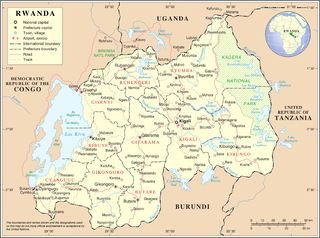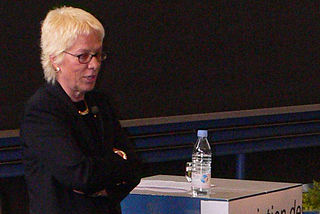Sir Charles Michael Dennis Byron is a former president of the Caribbean Court of Justice. He also serves as President of the Commonwealth Judicial Education Institute, and is former President of the International Criminal Tribunal for Rwanda (ICTR), and former Chief Justice of the Eastern Caribbean Supreme Court. He was born in Basseterre, Saint Kitts and Nevis.

United Nations Security Council resolution 955, adopted on 8 November 1994, after recalling all resolutions on Rwanda, the Council noted that serious violations of international humanitarian law had taken place in the country and, acting under Chapter VII of the United Nations Charter, established the International Criminal Tribunal for Rwanda (ICTR).

United Nations Security Council resolution 977, adopted unanimously on 22 February 1995, after recalling Resolution 955 (1994) in which the council was to determine the seat of the International Criminal Tribunal for Rwanda (ICTR) and noting a report by the Secretary-General Boutros Boutros-Ghali, the council decided that its seat would be in Arusha, Tanzania.

United Nations Security Council resolution 978, adopted unanimously on 27 February 1995, after recalling all previous resolutions on Rwanda, including 935 (1994) and 955 (1994), the Council instructed Member States on the arrest and detention of persons responsible for acts during the Rwandan genocide, within the jurisdiction of the International Criminal Tribunal for Rwanda (ICTR).

United Nations Security Council resolution 1047, adopted unanimously on 29 February 1996, after recalling resolutions 808 (1993), 827 (1993), 936 (1994) and 955 (1994), the Council appointed Louise Arbour as Prosecutor at the International Criminal Tribunal for Rwanda (ICTR) and the International Criminal Tribunal for the former Yugoslavia (ICTY).
United Nations Security Council resolution 1165, adopted unanimously on 30 April 1998, after recalling Resolution 955 (1994), the council established a third trial chamber at the International Criminal Tribunal for Rwanda (ICTR).

United Nations Security Council resolution 1200, adopted unanimously on 30 September 1998, after recalling resolutions 955 (1994), 989 (1995) and 1165 (1998), the Council forwarded 18 nominations for judges at the International Criminal Tribunal for Rwanda (ICTR) to the General Assembly for consideration.

United Nations Security Council resolution 1241, adopted unanimously on 19 May 1999, after noting a letter to the President of the Security Council from the President of the International Criminal Tribunal for Rwanda (ICTR), the Council endorsed a recommendation of the Secretary-General Kofi Annan that judge Lennart Aspegren complete the Georges Rutaganda and Alfred Musema cases which had begun before the expiry of his term of office.

United Nations Security Council resolution 1329, adopted unanimously on 30 November 2000, after recalling resolutions 827 (1993) and 955 (1994), the Council enlarged the appeals chambers at both the International Criminal Tribunal for Rwanda (ICTR) and the International Criminal Tribunal for the former Yugoslavia (ICTY), proposed the election of two additional judges at the ICTR and established a pool of ad litem judges at the ICTY.

United Nations Security Council Resolution 1932, adopted unanimously on June 29, 2010, after recalling resolutions 955 (1995), 1165 (1998), 1329 (2000), 1411 (2002), 1431 (2002), 1717 (2006), 1824 (2008), 1855 (2008), 1878 (2008) and 1901 (2009) on Rwanda, the Council noted that the 2010 target for the completion of trials at the International Criminal Tribunal for Rwanda (ICTR) could not be met, and therefore extended the terms of 16 judges at the ICTR.

United Nations Security Council resolution 1411, adopted unanimously on 17 May 2002, after recalling resolutions 827 (1993), 955 (1994), 1165 (1998), 1166 (1998) and 1329 (2000), the Council amended the statutes of the International Criminal Tribunals for Rwanda (ICTR) and the former Yugoslavia (ICTY) to address the issue of judges holding dual nationalities.
United Nations Security Council resolution 1431, adopted unanimously on 14 August 2002, after recalling resolutions 827 (1993), 955 (1994), 1165 (1998), 1166 (1998), 1329 (2000) and 1411 (2002), the council established a pool of temporary judges at the International Criminal Tribunal for Rwanda (ICTR) in order for it to complete its work as soon as possible.

United Nations Security Council resolution 1482, adopted unanimously on 19 May 2003, after noting correspondence between the President of the Security Council, President of the International Criminal Tribunal for Rwanda (ICTR) and President of the International Criminal Court, the Council extended the terms of office of four permanent judges at the ICTR in order to allow them to dispose of a number of ongoing cases.

United Nations Security Council resolution 1503, adopted unanimously on 28 August 2003, after recalling resolutions 827 (1993), 955 (1994), 978 (1995), 1165 (1998), 1166 (1998), 1329 (2000), 1411 (2002), 1431 (2002) and 1481 (2003), the Council decided to split the prosecutorial duties of the International Criminal Tribunal for the former Yugoslavia (ICTY) and the International Criminal Tribunal for Rwanda (ICTR) which had previously been under the responsibility of one official, Carla Del Ponte, since 1999.

United Nations Security Council resolution 1512, adopted unanimously on 27 October 2003, after recalling resolutions 955 (1994), 1165 (1998), 1329 (2000), 1411 (2002), 1431 (2002) and 1503 (2003) on Rwanda, the Council increased the number of temporary judges serving at the same time at the International Criminal Tribunal for Rwanda (ICTR) from four to nine.

United Nations Security Council resolution 1534, adopted unanimously on 26 March 2004, after recalling resolutions 827 (1993), 955 (1994), 978 (1995), 1165 (1998), 1166 (1998), 1329 (2000), 1411 (2002), 1431 (2002) and 1481 (2003), the Council called on the International Criminal Tribunal for the former Yugoslavia (ICTY) and the International Criminal Tribunal for Rwanda (ICTR) to complete all trial activities by the end of 2008.

United Nations Security Council Resolution 1955, adopted unanimously on December 14, 2010, after recalling resolutions 955 (1995), 1165 (1998), 1329 (2000), 1411 (2002), 1431 (2002), 1717 (2006), 1824 (2008), 1855 (2008), 1878 (2008), 1901 (2009) and 1931 (2010) on Rwanda, the Council permitted three judges to complete their cases at the International Criminal Tribunal for Rwanda (ICTR) beyond their terms of office, and increased the number of temporary judges at the tribunal.

United Nations Security Council Resolution 1966, adopted on December 22, 2010, after recalling resolutions 827 (1993) and 955 (1994), the Council established a residual mechanism to conclude the remaining tasks of the International Criminal Tribunals for Rwanda (ICTR) and former Yugoslavia (ICTY). It was the final Security Council resolution adopted in 2010.

United Nations Security Council Resolution 1684, adopted unanimously on June 13, 2006, after recalling resolutions 955 (1994), 1165 (1998), 1329 (2000), 1411 (2002), 1431 (2002), 1449 (2002), 1503 (2003) and 1534 (2004) concerning the International Criminal Tribunal for Rwanda (ICTR), the Council extended the terms of 11 judges beyond their expiry dates in order for them to complete the trials in which they were sitting.

United Nations Security Council Resolution 1717 was adopted unanimously on October 13, 2006; after recalling resolutions 955 (1995), 1165 (1998), 1329 (2000), 1411 (2002), 1431 (2002), 1449 (2002), 1503 (2003) and 1534 (2004) on Rwanda, the Council extended the terms of temporary judges at the International Criminal Tribunal for Rwanda (ICTR).














